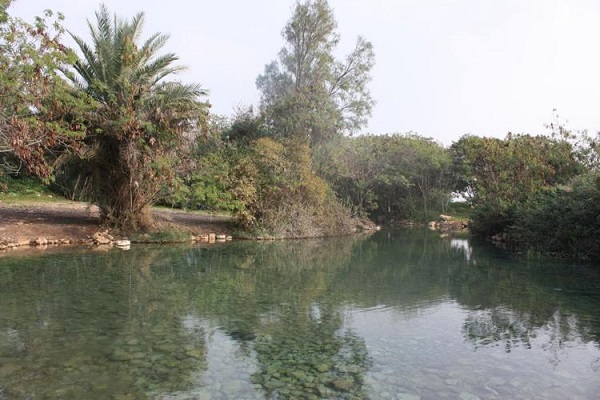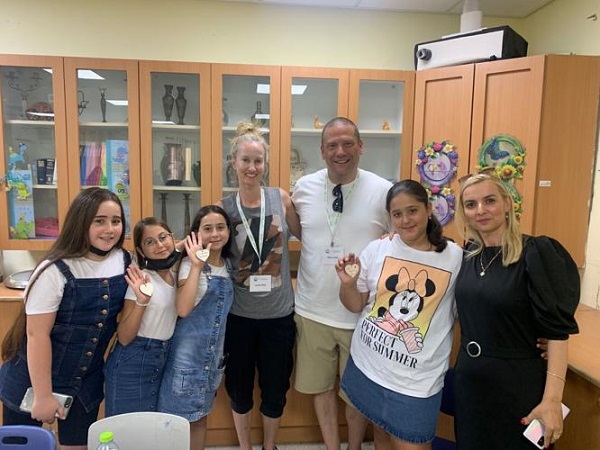04/24/2023
Cleveland, Beit Shean Connect on Similar Challenges, Opportunities for Change
- Share This Story

Fountain of Youth in Gan HaShlosha National Park, also known as Sahne, near Beit Shean.
AMANDA KOEHN
Article reprinted with permission from Cleveland Jewish News
In northern Israel about 40 miles southeast of Haifa and 70 miles northeast of Tel Aviv sits the town of Beit Shean/Valley of Springs. As Cleveland’s sister city, it faces similar geographic and cultural challenges – among them public perception and weather.
Those familiar challenges were part of why Jewish Federation of Cleveland leaders decided to partner with the Israeli counterpart back in 1995.
Mark Holz, chair of the Beit Shean subcommittee with the overseas connections committee for the Federation in Beachwood, said the connection began when Beit Shean’s previous partner city, Los Angeles, left amid the struggles Beit Shean faced. Federation leaders saw it as the right kind of challenge.
“It just was too eerily similar to Cleveland’s challenges and too many similarities between the communities and the periphery,” Holz told the Cleveland Jewish News.
Holz’s connection to Beit Shean began on one of his children’s bar mitzvah trips to Israel in 2015. Doing a mitzvah project with Youth Futures, a youth mentorship program supported by the Federation, the family connected with the people of Beit Shean on an unexpected level. It led to more volunteer work and growing an “extended family” there, he said.
“The experience was just so powerful that it changed the trajectory of my family’s life,” said Holz, a Beachwood resident who attends Solon Chabad.

Mark Holz and his wife, Leslie, center, visit a Beit Shean school.
Ilanit Gerblich Kalir, assistant vice president of external affairs at the Federation, has been working with Beit Shean since 2010 and has visited “some tens of times, she told the CJN. An overarching aim of the partnership is to create authentic, meaningful relationships between Israelis and Americans.
When the partnership began, it was a strategy of the Jewish Agency for Israel to have federations adopt communities in Israel, she added. Decades later, the partnership between Cleveland and Beit Shean became officially recognized by the city of Cleveland in 2019.
Beit Shean is somewhat of a “microcosm of so many aspects of Israel,” said Kalir, who resides in Pepper Pike and attends Congregation Shaarey Tikvah in Beachwood. It has kibbutzim and moshavim, or collective farms, a city portion and beautiful natural attractions.
The hardships Beit Shean faces are somewhat common for localities geographically far from central Israeli cities, she said.
“In general in Israel, the farther you are away from Tel Aviv or one of these major cities, the less job opportunities there are,” she said.
Like other municipalities on the periphery of Israel, Beit Shean was settled quickly by immigrants mainly in the 1950s without comprehensive city planning. This also led to societal challenges, in addition to the town being on an earthquake fault line and the weather being exceptionally hot, Kalir and Holz said.

Kalir
These challenges are improving though. A new train station to Haifa has provided access to new job opportunities, helping remedy isolation affecting Beit Shean for generations now, Holz said.
The Federation also supports programs that increase access to resources and upward mobility for residents. For example, Youth Futures connects at-risk youth in Beit Shean with mentors who work with them and their families. The Federation piloted it in Beit Shean in 2006, and it is now in 36 localities across Israel, Kalir said.
Another Federation-supported program, Conversation Partners, matches Clevelanders with Beit Shean residents to talk weekly for several months, with the goal of meeting and relating to a new friend. It also helps the Israelis practice English. More than 125 people have taken part, Holz said, and it has a waiting list for Beit Shean participants.
“It gives these two people – one in the diaspora, one in Israel – an opportunity to understand their life, their Jewish life, their family life, how they celebrate holidays, things like that,” Holz said.
Kalir added that Beit Shean is home to a strong population of Mizrachi and Sephardic Jews, who often have rich, different Jewish traditions than their American counterparts.
Some Cleveland conversation partners have traveled to Beit Shean to meet their new friends. This is important because in past generations, more Clevelanders had relatives in Israel. Today, those familial connections to the country are seemingly less common, Kalir said. Programs like Conversation Partners help establish family-like relationships to Beit Shean and Israel more broadly.
“... Conversations Partners is exactly like you’re going to visit that cousin, theoretically, in Beit Shean,” Kalir said.
STEM Israel, another Federation-supported program, works to propel Israeli students from disadvantaged backgrounds to successful futures with skills in science, technology, engineering, arts and mathematics. Launched in 2017, “People in Israel are watching very closely what we’ve done with STEM in the region and are starting to implement their own programs, whereas Cleveland took a leadership role in that,” Holz said.
STEM in school is increasingly important as in Israel, career opportunities are often tied to where young adults are placed for their mandatory army service, Holz said. To serve in many top units, strong English and tech skills play a role.
“For some of these kids, they can be six, seven, eight years old and their future is already written because they’re not getting those skills,” Holz said.
The Federation is also building leadership opportunities in Beit Shean. Last fall, a young professionals delegation from the sister city visited Cleveland to learn from leaders here and help stimulate change in their own community. Delegations of groups like chefs, STEM leaders or social service providers have also visited Cleveland over the years.
“The idea is that if you can build networks and cohorts of people who see the city and the city’s challenges in the same way, they can collectively come up with solutions to tackle them,” Kalir said.
And hundreds of Northeast Ohioans visit Beit Shean yearly – including local Jewish day schools, teen groups and different Federation delegations.
Through building connections between Clevelanders and Beit Shean residents, challenges and opportunities experienced by both are shaped by their sister city, Kalir and Holz said. As both Cleveland and Beit Shean tend to be family-oriented and historically don’t have the most positive reputations, the partnership has allowed for a better understanding of one’s homeland and how to improve it, while also benefiting a community across the world.
“We think a lot about similar challenges and how to change public perception about your place,” Kalir said. “And I think that has really enabled those partnerships to be so mutually beneficial.”

